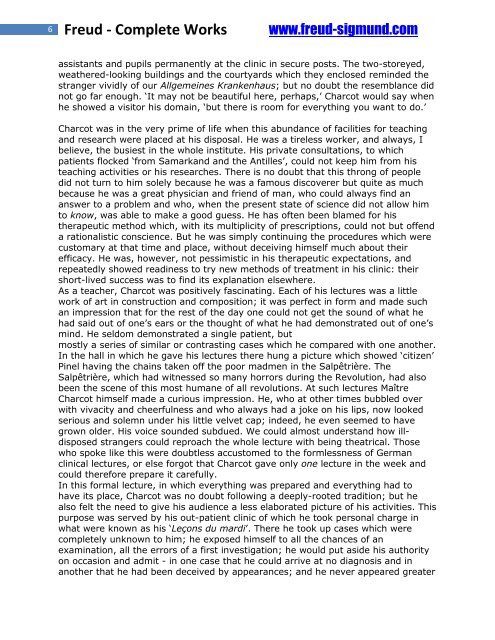Charcot - Sigmund Freud
Charcot - Sigmund Freud
Charcot - Sigmund Freud
You also want an ePaper? Increase the reach of your titles
YUMPU automatically turns print PDFs into web optimized ePapers that Google loves.
6 <strong>Freud</strong> - Complete Works www.freud-sigmund.com<br />
assistants and pupils permanently at the clinic in secure posts. The two-storeyed,<br />
weathered-looking buildings and the courtyards which they enclosed reminded the<br />
stranger vividly of our Allgemeines Krankenhaus; but no doubt the resemblance did<br />
not go far enough. ‘It may not be beautiful here, perhaps,’ <strong>Charcot</strong> would say when<br />
he showed a visitor his domain, ‘but there is room for everything you want to do.’<br />
<strong>Charcot</strong> was in the very prime of life when this abundance of facilities for teaching<br />
and research were placed at his disposal. He was a tireless worker, and always, I<br />
believe, the busiest in the whole institute. His private consultations, to which<br />
patients flocked ‘from Samarkand and the Antilles’, could not keep him from his<br />
teaching activities or his researches. There is no doubt that this throng of people<br />
did not turn to him solely because he was a famous discoverer but quite as much<br />
because he was a great physician and friend of man, who could always find an<br />
answer to a problem and who, when the present state of science did not allow him<br />
to know, was able to make a good guess. He has often been blamed for his<br />
therapeutic method which, with its multiplicity of prescriptions, could not but offend<br />
a rationalistic conscience. But he was simply continuing the procedures which were<br />
customary at that time and place, without deceiving himself much about their<br />
efficacy. He was, however, not pessimistic in his therapeutic expectations, and<br />
repeatedly showed readiness to try new methods of treatment in his clinic: their<br />
short-lived success was to find its explanation elsewhere.<br />
As a teacher, <strong>Charcot</strong> was positively fascinating. Each of his lectures was a little<br />
work of art in construction and composition; it was perfect in form and made such<br />
an impression that for the rest of the day one could not get the sound of what he<br />
had said out of one’s ears or the thought of what he had demonstrated out of one’s<br />
mind. He seldom demonstrated a single patient, but<br />
mostly a series of similar or contrasting cases which he compared with one another.<br />
In the hall in which he gave his lectures there hung a picture which showed ‘citizen’<br />
Pinel having the chains taken off the poor madmen in the Salpêtrière. The<br />
Salpêtrière, which had witnessed so many horrors during the Revolution, had also<br />
been the scene of this most humane of all revolutions. At such lectures Maître<br />
<strong>Charcot</strong> himself made a curious impression. He, who at other times bubbled over<br />
with vivacity and cheerfulness and who always had a joke on his lips, now looked<br />
serious and solemn under his little velvet cap; indeed, he even seemed to have<br />
grown older. His voice sounded subdued. We could almost understand how illdisposed<br />
strangers could reproach the whole lecture with being theatrical. Those<br />
who spoke like this were doubtless accustomed to the formlessness of German<br />
clinical lectures, or else forgot that <strong>Charcot</strong> gave only one lecture in the week and<br />
could therefore prepare it carefully.<br />
In this formal lecture, in which everything was prepared and everything had to<br />
have its place, <strong>Charcot</strong> was no doubt following a deeply-rooted tradition; but he<br />
also felt the need to give his audience a less elaborated picture of his activities. This<br />
purpose was served by his out-patient clinic of which he took personal charge in<br />
what were known as his ‘Leçons du mardi’. There he took up cases which were<br />
completely unknown to him; he exposed himself to all the chances of an<br />
examination, all the errors of a first investigation; he would put aside his authority<br />
on occasion and admit - in one case that he could arrive at no diagnosis and in<br />
another that he had been deceived by appearances; and he never appeared greater



